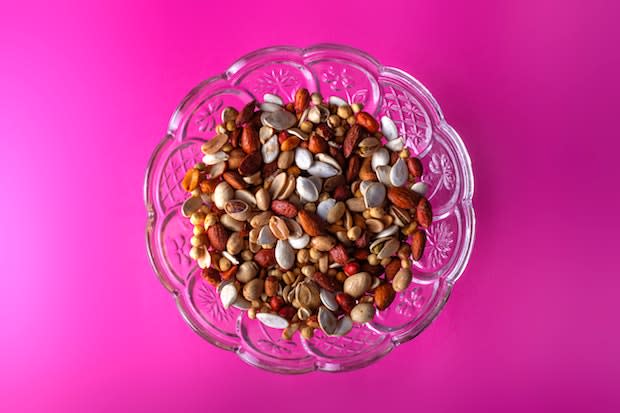Table of Contents
I. The Goal of Natural Remedies
b. Correcting Microbiome Imbalance
V. Advantages of Natural Treatment
The Goal of Natural Remedies
Thyroid problems are usually treated with prescription medications like Synthroid (levothyroxine), desiccated thyroid, and Tapazole (methimazole). While these drugs are effective, there are many reasons you might want to try natural treatments for your thyroid problem. For example, you might be looking to explore treatments that do not cause specific side effects. You may also be looking for ways to treat the root of your thyroid problem and not merely its symptoms.
Natural remedies aim to address the underlying cause of your thyroid problems. Many times, this means resolving your thyroid problems by improving your overall health. Whether you have been diagnosed with hyperthyroidism or hypothyroidism, there are several ways to naturally treat your condition. [1]
Hyperthyroidism
a. Underlying Causes
An overactive thyroid causes too much thyroid hormone to be secreted into your bloodstream. Having excess thyroid hormones can cause many of your bodily functions to speed up. Metabolism and heart rate can increase, and you may experience high blood pressure, fatigue, diarrhea, and sleep problems. So, what causes hyperthyroidism? Some known causes of hyperthyroidism include Graves’ disease, excess iodine (an essential mineral), and throat cancer. [2]
Get savings updates for Synthroid
b. Modifying Your Diet
Iodine is a mineral that helps your body make thyroid hormones, so reducing your iodine intake can prevent your thyroid from being overactive. Low-iodine foods include:
- Fresh fruit and unsalted nuts
- Egg whites
- Oats and potatoes
- Homemade loaves of bread without salt, eggs, or dairy
- Maple syrup and honey
Cruciferous vegetables, meaning plants from the cabbage family, have properties that may stop your thyroid from using iodine. Cruciferous vegetables that may be helpful with hyperthyroidism include: On top of adding low-iodine foods and cruciferous vegetables to your diet, certain vitamins and minerals are important for balancing thyroid hormone production. Low iron levels negatively impact thyroid health, so you may want to consume foods high in iron whenever possible. Some iron-rich foods include: Selenium, zinc, calcium, and vitamin D are essential to your thyroid health as well. Selenium helps deter damage to your cells, and zinc helps to convert food into energy. Calcium and vitamin D may restore bone mass that is lost because of hyperthyroidism. [2] Synthetic levothyroxine and desiccated thyroid can be very effective for hypothyroidism that is caused by digestive system inflammation, nutritional deficiencies, prolonged stress, or elevated estrogen levels. However, the most common cause of hypothyroidism is actually autoimmune thyroid disease, also known as Hashimoto’s. If your hypothyroidism is caused by Hashimoto’s, you may find that taking synthetic or desiccated thyroid hormone does not treat the underlying cause of your disease. Patients with Hashimoto’s may not absorb synthetic thyroid hormone well and find that their medications create recurring symptoms. [1] To achieve healthy thyroid function, your body needs the right nutrients. Without the right vitamins and minerals, your body’s microbiome can be thrown off balance. Your microbiome consists of trillions of different fungi, bacteria, viruses, and parasites that live together in harmony. [3] Research shows that microbiome imbalance is a major cause of autoimmune conditions like Hashimoto’s. Microbiome imbalance can be corrected through a healthy diet that is low in sugar and carbohydrates. Probiotics and cultured foods may also decrease inflammation and rebalance your microbiome. If you are also diagnosed with celiac disease, you may need to remove gluten from your diet to treat your microbiome imbalance and improve your hypothyroidism. [1] In addition to microbiome imbalance, persistent inflammation in the gut may be an underlying cause of Hashimoto’s as well. Gut inflammation, more commonly called inflammatory bowel disease (IBD), is the result of your immune system attacking a harmless bacteria, virus, or food in your gut. [4] Gut inflammation may be improved by implementing a healthy diet low in carbohydrates and high in vitamin B-12, selenium, and zinc. A healthier gut can lead to a healthier thyroid. [1] There are botanical herbs that have been shown to improve thyroid function. An adaptogen is a non-toxic plant or root that has healing properties. [1] [5] Adaptogens like Ashwagandha root extract regulate metabolism and may improve mild cases of hypothyroidism. Other herbs that may improve thyroid function include gum guggul (Commiphora mukul), blue flag root (Iris versicolor), bladder wrack (Fucus vesiculosus), and seaweed. [6] The biggest advantage of treating thyroid problems naturally is that there are typically fewer side effects. For people with subclinical thyroid problems, taking the natural path may be ideal. However, regulating thyroid function is a difficult task. Natural therapies may address underlying causes and seek to treat thyroid problems by restoring overall health, but any herbal treatment or dietary change should be approved by a professional. [1] The content in this article is intended for informational purposes only. This website does not provide medical advice. In all circumstances, you should always seek the advice of your physician and/or other qualified health professionals(s) for drug, medical condition, or treatment advice. The content provided on this website is not a substitute for professional medical advice, diagnosis, or treatment.
c. Supplementation

Hypothyroidism
a. Underlying Causes
b. Correcting Microbiome Imbalance
c. Treating Gut Inflammation

Natural Herbs
Advantages of Natural Treatment
